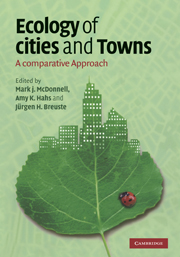Book contents
- Frontmatter
- Contents
- List of contributors
- Preface
- 1 Introduction: Scope of the book and need for developing a comparative approach to the ecological study of cities and towns
- Part I Opportunities and challenges of conducting comparative studies
- Part II Ecological studies of cities and towns
- Part III Integrating science with management and planning
- 21 Structural analysis of urban landscapes for landscape management in German cities
- 22 Preservation of original natural vegetation in urban areas: an overview
- 23 Homogeneity of urban biotopes and similarity of landscape design language in former colonial cities
- 24 Tools to assess human impact on biotope resilience and biodiversity in urban planning: examples from Stockholm, Sweden
- 25 Landscape ecological analysis and assessment in an urbanising environment
- 26 Applying landscape ecological principles to a fascinating landscape: the city
- 27 A trans-disciplinary research approach providing a platform for improved urban design, quality of life and biodiverse urban ecosystems
- 28 Pattern: process metaphors for metropolitan landscapes
- 29 Valuing urban wetlands: modification, preservation and restoration
- Part IV Comments and synthesis
- References
- Index
- Plate section
27 - A trans-disciplinary research approach providing a platform for improved urban design, quality of life and biodiverse urban ecosystems
Published online by Cambridge University Press: 04 March 2010
- Frontmatter
- Contents
- List of contributors
- Preface
- 1 Introduction: Scope of the book and need for developing a comparative approach to the ecological study of cities and towns
- Part I Opportunities and challenges of conducting comparative studies
- Part II Ecological studies of cities and towns
- Part III Integrating science with management and planning
- 21 Structural analysis of urban landscapes for landscape management in German cities
- 22 Preservation of original natural vegetation in urban areas: an overview
- 23 Homogeneity of urban biotopes and similarity of landscape design language in former colonial cities
- 24 Tools to assess human impact on biotope resilience and biodiversity in urban planning: examples from Stockholm, Sweden
- 25 Landscape ecological analysis and assessment in an urbanising environment
- 26 Applying landscape ecological principles to a fascinating landscape: the city
- 27 A trans-disciplinary research approach providing a platform for improved urban design, quality of life and biodiverse urban ecosystems
- 28 Pattern: process metaphors for metropolitan landscapes
- 29 Valuing urban wetlands: modification, preservation and restoration
- Part IV Comments and synthesis
- References
- Index
- Plate section
Summary
Introduction
In this chapter, we report on the development of a trans-disciplinary research programme now under way in New Zealand which is designed to bring low impact urban design and development (LIUDD) practices into the mainstream. The development of LIUDD in New Zealand has drawn on earlier initiatives such as Low Impact Development (LID; Shaver, 2000), an alternative approach to stormwater management in North America. LID has much in common with Water Sensitive Urban Design (WSUD) in Australia (Lloyd et al., 2001b) which deliberately embraces LID as well as other elements. A strong driver has been the need to enhance sustainability of the built environment through an integrated approach to urban design and development (van Roon, 2005). LIUDD aims to avoid a wide range of adverse physiochemical, biodiversity, social, economic and amenity effects that arise from conventional urban development and, at the same time, aims to protect aquatic and terrestrial ecological integrity (van Roon and Knight, 2004; van Roon and van Roon, 2005). With appropriate planning, funding and management, it is possible to have different patterns of development and intensities of development, whilst still meeting environmental standards and economic aspirations.
The chapter first provides some commentary on urban development practices in Auckland and New Zealand which provides a rationale for the development of the research approach. Second, key environmental, economic and social benefits of implementing LIUDD are identified through stakeholder interviews and literature reviews. Finally, the research programme and its four themes are outlined.
- Type
- Chapter
- Information
- Ecology of Cities and TownsA Comparative Approach, pp. 470 - 483Publisher: Cambridge University PressPrint publication year: 2009



